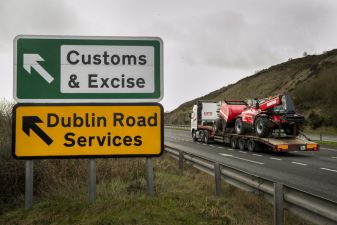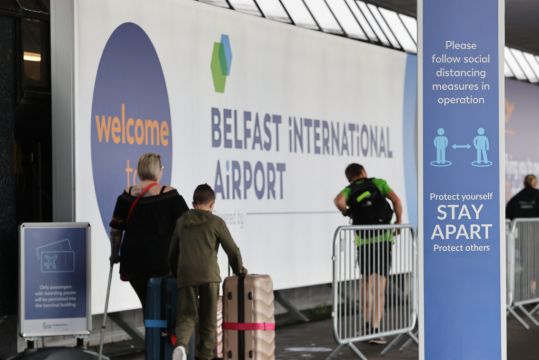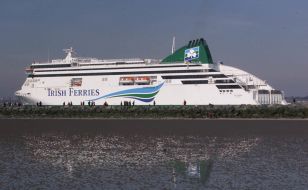Following the discovery of a new strain of Covid-19 in the UK, governments across Europe have taken the decision to close their borders to passengers arriving from Britain in an effort to keep the variant, which is thought to up 70 per cent more infectious, out of their countries.
On Sunday, the Irish Government announced the decision to impose a 48-hour ban on flights arriving in Ireland from Britain from midnight, while reducing ferry transport to freight and key supply workers only.
The decision has left some Irish people stranded in parts of the UK, while a similar travel ban by the French government has left many Irish hauliers, who use the UK as a land-bridge to mainland Europe, stuck in France.
Is anything being done to get Irish people home from Britain?
Yes. The Department of Foreign Affairs is working to repatriate Irish people who are now stuck in the UK, or because they are unable to pass through the UK to get home.
Speaking on Monday morning, Minister for Foreign Affairs Simon Coveney confirmed flights were being arranged to get people home from the UK, while some hauliers will be able to avail of direct ferry routes from France to Ireland to avoid Britain.
Who will qualify for repatriation?
The Department has said there are two groups of people who qualify to avail of the repatriation process:
- International travellers to Ireland who are transiting through Great Britain.
- Irish people normally resident in Ireland, who are currently on short trips to Great Britain and need to get back to Ireland within the next few days.
The Department notes that the second category will include people who travelled to the UK for emergency medical treatment.
This means Irish people living in the UK who may have been planning to return to family in Ireland for Christmas will not be permitted to do so and will have to remain in Britain.
The Government has set up a helpline for anyone who needs to avail of the repatriation services.
We have set up a GB Emergency Travel Helpline. You can contact the consular assistance team on 01 613 1700. Please be patient as there is a high volume of calls.
Advertisement— Irish Foreign Ministry (@dfatirl) December 21, 2020
What will people who are repatriated have to do once back in Ireland?
Ireland has signed up for to the EU's traffic light system for international travel. Under that system, passengers arriving in Ireland from the UK (a red region) would normally be required to 'restrict their movements' for two-weeks.
According to the Government's website, restricting your movements means “staying home or in your accommodation and avoiding contact with other people, including those in your household that are at particular risk should they contract Covid-19”.
After five days, the passenger has the option to take a PCR test, which, if negative, allows them to stop restricting their movements. However, given the serious nature of the travel ban, the Department has said those guidelines will not apply to passengers arriving from the UK for now, with more stringent measures taking their place.
“Public health advice is that anyone who travels from GB to Ireland over the period ahead, including anyone in the categories who are facilitated in travelling back to Ireland, should self-isolate for 14 days upon arrival.
“Self-isolation means staying indoors and completely avoiding contact with other people. There are no exceptions to this other than the essential workers.”
What does this mean for Christmas plans?
The Department's instructions mean anyone who now returns from Britain will essentially have to cancel their plans until the first week of the New Year.
According to the Government website, self-isolation involves staying in a room with a window which can be opened, having no contact with other people, eating meals in your room and using a bathroom separate from other people in the house who are not isolating.
Also, you cannot have visitors to your home, use public transport or go outside (unless you have a personal outdoor space not used by others) during the isolation period.
In short, you will not be able to interact with anyone over Christmas or the New Year unless they travelled back from the UK with you and you are isolating together.
Are there plans to end the travel ban?
No, the opposite. The ban is due to end at midnight on Tuesday, but Cabinet will meet tomorrow evening to discuss a range of Covid-19 measures following recommendations from the National Public Health Emergency Team (Nphet).

It is expected Cabinet will decide to extend the travel ban beyond Tuesday night.
What about the Border with Northern Ireland?
Although Northern Ireland First Minister Arlene Foster said it was likely the new strain of Covid-19 has already reached the North, the Irish Government has opted not to close the Border.
Mr Coveney said a cross-Border ban would not be implemented as people on both sides travel across the frontier regularly for essential reasons.
There are fears the Belfast airports will be used as a workaround for people returning from Britain, flying there before crossing the Border into the Republic, posing a major risk of spreading the new Covid variant across the island.







